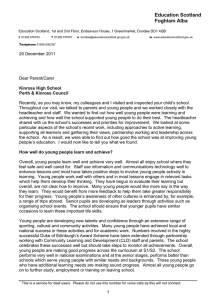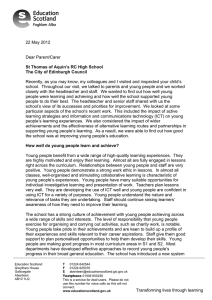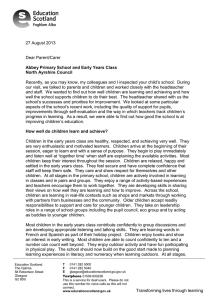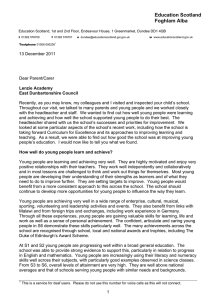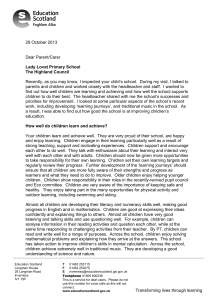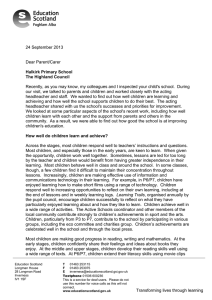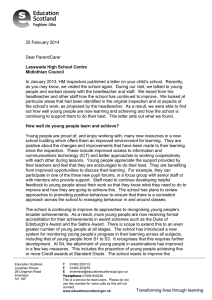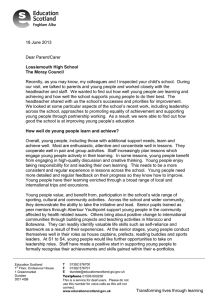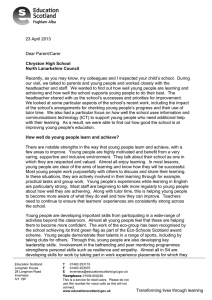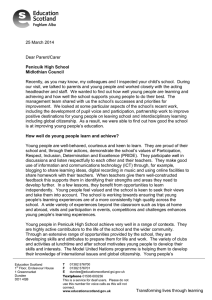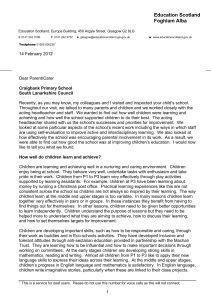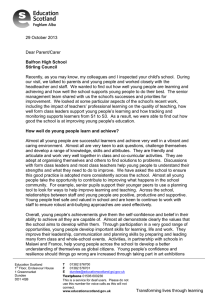8 January 2013 Dear Parent/Carer
advertisement
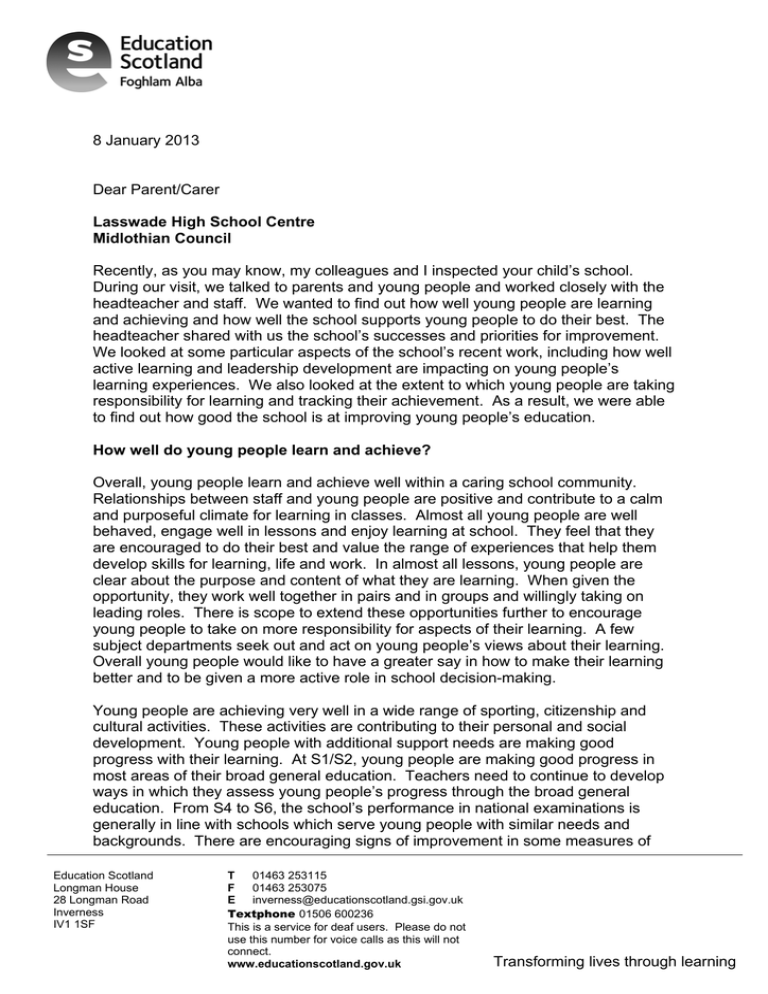
8 January 2013 Dear Parent/Carer Lasswade High School Centre Midlothian Council Recently, as you may know, my colleagues and I inspected your child’s school. During our visit, we talked to parents and young people and worked closely with the headteacher and staff. We wanted to find out how well young people are learning and achieving and how well the school supports young people to do their best. The headteacher shared with us the school’s successes and priorities for improvement. We looked at some particular aspects of the school’s recent work, including how well active learning and leadership development are impacting on young people’s learning experiences. We also looked at the extent to which young people are taking responsibility for learning and tracking their achievement. As a result, we were able to find out how good the school is at improving young people’s education. How well do young people learn and achieve? Overall, young people learn and achieve well within a caring school community. Relationships between staff and young people are positive and contribute to a calm and purposeful climate for learning in classes. Almost all young people are well behaved, engage well in lessons and enjoy learning at school. They feel that they are encouraged to do their best and value the range of experiences that help them develop skills for learning, life and work. In almost all lessons, young people are clear about the purpose and content of what they are learning. When given the opportunity, they work well together in pairs and in groups and willingly taking on leading roles. There is scope to extend these opportunities further to encourage young people to take on more responsibility for aspects of their learning. A few subject departments seek out and act on young people’s views about their learning. Overall young people would like to have a greater say in how to make their learning better and to be given a more active role in school decision-making. Young people are achieving very well in a wide range of sporting, citizenship and cultural activities. These activities are contributing to their personal and social development. Young people with additional support needs are making good progress with their learning. At S1/S2, young people are making good progress in most areas of their broad general education. Teachers need to continue to develop ways in which they assess young people’s progress through the broad general education. From S4 to S6, the school’s performance in national examinations is generally in line with schools which serve young people with similar needs and backgrounds. There are encouraging signs of improvement in some measures of Education Scotland Longman House 28 Longman Road Inverness IV1 1SF T 01463 253115 F 01463 253075 E inverness@educationscotland.gsi.gov.uk Textphone 01506 600236 This is a service for deaf users. Please do not use this number for voice calls as this will not connect. www.educationscotland.gov.uk Transforming lives through learning performance in national examinations at the upper stages. There is scope for more young people to achieve better, particularly at S4. The proportion of young people leaving school and progressing onto positive destinations such as training, further or higher education or work on leaving school is increasing and is now above the national average. How well does the school support young people to develop and learn? Overall, the school supports young people to learn well. Most teachers match tasks and activities to the needs and abilities of learners. In a minority of lessons, teachers need to increase the level of difficulty of planned tasks to challenge all young people more effectively and meet their needs better. Support staff, including learning assistants, provide effective support for young people in classes. There is strong pastoral support for young people across the school. Support staff identify young people who require additional support, assess their needs well and work effectively in partnership with a range of services and specialists to address these needs. The few young people supported in the Midlothian Base within the school are supported well and included in mainstream lessons where appropriate. Support plans for young people who require additional support in their learning could be better focused and more regularly reviewed to ensure young people are progressing as well as they could. Overall, the curriculum provides young people with a broad range of learning experiences. Increasingly motivating and relevant new courses are in place across all subject areas at S1 and S2. In taking forward Curriculum for Excellence, the school needs to ensure that all young people receive their entitlement to a broad, general education. The curriculum currently provides a suitable range of courses for young people from S4 to S6. The school needs to ensure that plans to develop the curriculum at S3 and at the senior phase from S4 to S6 are agreed and shared with staff, parents and young people before they are implemented. It needs to strengthen its approaches to developing young people’s literacy, numeracy and health and wellbeing. Young people at the senior stages need better-planned opportunities for religious, moral and philosophical studies. Several subject departments have important links with primary schools to help young people progress in their learning and the school is continuing to build on this work. How well does the school improve the quality of its work? Staff are committed to providing young people with positive learning experiences. There is a clear whole-school process for target-setting and tracking young people’s progress from S3 onwards and this should now be extended into S1 and S2. Teachers regularly review how well young people have performed in national examinations. These reviews are not yet resulting in clear plans for improvement. Faculties and departments have a range of approaches to evaluating their own work. Teachers reflect on their lessons and share ideas to improve their classroom practice. These processes are not leading to enough improvement in young people’s learning and achievements. The school needs to give more emphasis to gathering and responding to the views of young people, parents and partners and involve them more consistently and meaningfully in improving the work of the school. 2 Teamwork in the senior management team and communication across the school needs to be improved to ensure that the school reaches its full potential. Overall, the school lacks strategic leadership and direction, particularly in developing the curriculum and ensuring that self-evaluation achieves appropriate and sustained improvement. This inspection found the following key strengths. • • • Positive, courteous young people who are interested in learning. The impact of partnership working in providing support for young people’s learning and achievement. The commitment of teachers and support staff to ensuring positive outcomes for young people. We discussed with staff and the education authority how they might continue to improve the school. This is what we agreed with them. • • • Increase the pace of curriculum development to ensure young people’s needs and entitlements are fully met. Improve the impact of self-evaluation on learning, teaching and achievement. Improve senior leadership and team-working for school improvement and achieving a mutual sense of purpose across the school. What happens at the end of the inspection? As a result of our inspection findings we think that the school needs additional support and more time to make necessary improvements. Our Area Lead Officer along with the local authority will discuss the most appropriate support in order to build capacity for improvement, and will maintain contact to monitor progress. We will return to evaluate aspects of provision and the progress in improving provision within one year of publication of this letter. We will then issue another letter to parents on the extent to which the school has improved. In that letter we will inform you if we are going to carry out a continued inspection visit. Marie McAdam HM Inspector Additional inspection evidence, such as details of the quality indicator evaluations, for your school can be found on the Education Scotland website at http://www.educationscotland.gov.uk/inspectionandreview/reports/school/primsec/La sswadeHighSchoolCentreMidlothian.asp. Please contact us if you want to know how to get the report in a different format, for example, in a translation. You can contact us at enquiries@educationscotland.gsi.gov.uk or write to us at BMCT, Education Scotland, Denholm House, Almondvale Business Park, Almondvale Way, Livingston EH54 6GA. 3 If you want to give us feedback or make a complaint about our work, please contact 01506 600200, or write to us at the above address or e-mail: feedback@educationscotland.gsi.gov.uk. 4
